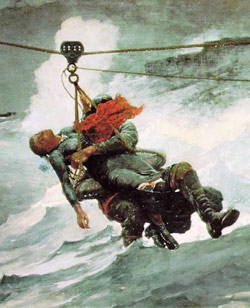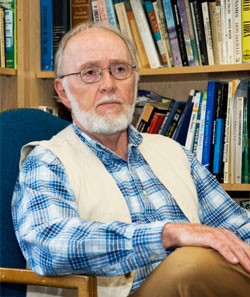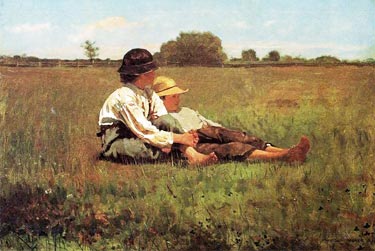
Colby-Sawyer College Screens First Feature-Length Documentary on American Painter Winslow Homer, Featuring 180 of His Works
NEW LONDON, N.H. – Colby-Sawyer College will host a screening of "Winslow Homer: Society and Solitude," the first feature-length film made about one of America's greatest painters.
The screening, with an introduction by and discussion with the film's associate producer, New London resident and former Colby-Sawyer Humanities Professor Don Coonley, will take place on Wednesday, March 3, at 7 p.m. in Wheeler Hall at the Ware Campus Center. The event is open to the public and admission is free.
Coonley, a former professor in Colby-Sawyer College's Communication Studies Program, worked on the Homer documentary for six years and has collaborated with the director, Steve Ross, on film projects for the last three decades. In addition to his work as associate producer, Professor Coonley was also a sound recorder and the on-screen and voice-over actor representing Homer in re-creation sequences filmed at the artist's studio on Prout's Neck, Maine.
"Winslow Homer: Society and Solitude" premiered on March 6, 2007, in Memphis, Tenn., and has since been screened at universities, museums and art centers across the country. The film chronicles Homer's artistic evolution, from his early life amid a lively and cosmopolitan New York City art scene to his gradual withdrawal into a reclusive lifestyle. In his mid-40s Homer left America and lived alone in a small English fishing village for more than a year. When he returned, he built a studio residence on a cliff overlooking the ocean in Maine and lived there for the rest of his life. By the time of his death in 1910, Homer was mythologized as the great recluse of American art.
Homer's work as an illustrator for Harper's Weekly reveals much about American life before, during and after the Civil War, up to 1880. In later life, his work evolved in a different way; he created a series of masterpiece paintings that inspired his reputation as the most profound visual poet of the sea and of nature's other elemental themes. Homer became a master of more than one artistic medium and for many, his innovative work in watercolor represents an even greater achievement than the oil paintings for which he was most well known.

The film offers insights into some mysteries that have long surrounded Homer's life and work and into important periods of American history, according to Professor Coonley. As he learned more about the artist, Professor Coonley's respect for Homer grew. "'Society and Solitude' brings together most of the major scholars on Homer in one place, and through their understanding of him and his work, we learn about America in his time," he explains. "The film explores overlooked aspects of his life such as his relationships with women and his attitudes toward both the natural world and political events."
After 18 years in the Humanities Department at Colby-Sawyer, Professor Coonley retired in May 2007 to pursue a career as an independent filmmaker and writer. He is currently the writer and videographer of a documentary in progress, "Nebraska Childhood," based on his own early life. During his tenure at the college, he founded and oversaw the growth of the Communications Studies Program and its related radio program and station, WSCS-FM, and a video production program. He also established and produced "Colby-Sawyer Insights," a student video news magazine, and he executive-produced more than 60 community service student video productions and senior capstone projects over the years.
Professor Coonley was the author and director of video sequences for "Celestial Reckoning," a multimedia stage play produced at Colby-Sawyer College in 1999. He was recognized with the Jack Jensen Award for Teaching Excellence and Campus Leadership in 1994 and the Faculty Award for Teaching Excellence in 1992.
One hundred years after his death, Winslow Homer remains in the public eye. In 2006 The National Gallery of Art presented a Homer exhibition that drew large crowds and resulted in two major pieces in The New Yorker magazine. Also in 2006, major Homer exhibitions were held in London and in France, and the Chicago Art Institute hosted a major exhibition of Homer's watercolor paintings in early 2008.

Before "Winslow Homer: Society and Solitude," the most complete documentary on Homer was only a half-hour long and more than 25 years old. The new film depicts more than 180 Homer paintings, watercolors, etchings and illustrations, which were filmed in the Homer family archives and museums including The Boston Museum of Fine Arts, The National Gallery of Art, The Portland Museum of Art and The Fogg Museum at Harvard University. Re-creation scenes of Homer in Maine were shot with the cooperation of his descendants at his cliff-side studio in Prout's Neck. Other locations captured by 16mm cameras for this project include Gloucester, Mass., and The North Woods Club in the Adirondacks.
This event is sponsored by the Colby-Sawyer Cultural Events Committee. Major funding for the documentary project was provided by Humanities Tennessee, with additional support from the Scheidt Family Foundation, Dorothy Kirsch, the Virginia Foundation for the Humanities, the Tennessee Arts Commission, Mr. J. Michael Robinson and other private donors.
To learn about other upcoming events at Colby-Sawyer College visit www.colby-sawyer.edu/events
Colby-Sawyer, founded in 1837, is a comprehensive liberal arts and sciences college located in the scenic Lake Sunapee Region of central New Hampshire. Students learn in small classes through a select array of programs that integrate the liberal arts and sciences with professional experience.
Colby-Sawyer College, 541 Main Street, New London, N.H. 03257 (603) 526-3000


